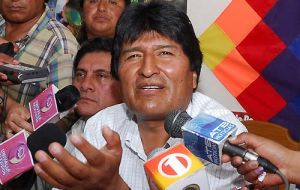MercoPress. South Atlantic News Agency
South America leaders meet to address Bolivian crisis
 Pte. Morales will be the centrer of UNASUR urgent summit
Pte. Morales will be the centrer of UNASUR urgent summit Bolivia's government said on Sunday it had reached a basic agreement with the opposition on ending the violence which officials say has left at least 30 people dead. The deal came after long hours of talks in the capital, La Paz.
But a state of emergency remains in the northern region of Pando, where troops have re-entered the capital, Cobija. On Saturday, Interior Minister Alfredo Rada accused Pando Governor Leopoldo Fernandez of hiring foreign assassins to "massacre" pro-government farmers and an arrest order against him was issued. Meanwhile, neighboring Chile called an emergency meeting for Monday of the Union of South American Nations to help promote a democratic solution to the crisis. All South American countries have expressed their full support to President Evo Morales (the country's first elected indigenous leader) and Bolivian institutions The conflict has arisen over radical plans by President Morales to re-distribute the country's wealth, including land, and give a greater voice to the large indigenous community. In the middle of the conflict Morales expelled the US ambassador from Bolivia, accusing him of stoking anti-government sentiment. The US says the accusation is baseless. Interior minister Rada claimed Governor Fernandez hired "Brazilian and Peruvian assassins" to carry out the "ambush" on Pando pro government peasants. A local farmers' leader, Shirley Segovia, told Erbol radio that the victims "were killed like pigs, with machine guns, with rifles, with shotguns, with revolvers". Mr Fernandez has denied having anything to do with the deaths, insisting they were the result of clashes between rival groups. "The government has a great ability to distort things, and its arguments are always the same - accusations without reason," he told Radio Fides. Five, out of nine, rebellious provinces are demanding that the government cancel a planned constitutional referendum on December 7 that would give more power to indigenous and poor communities by carrying out land reform and redistributing gas revenues. The best farm land and most gas reserves are in the four provinces which instead are fighting for greater autonomy as well as more control over revenues of natural gas in their areas. Meantime all is ready in Santiago de Chile to receive South American leaders to discuss ways to support the democratic system in Bolivia. However Brazil's Lula da Silva who confirmed his participation anticipated he's "not entirely convinced of the regional summit" and believes there should be "no interference in Bolivian domestic affairs". "This meeting only is meaningful if on request of Bolivia and with a proposal, because if both sides of the conflict don't ask us to meet, if we come to a decision and no side abides, it will have been a useless exercise", Lula da Silva was quoted Sunday in the Brazilian press. "It must be plain clear we have no right to make any decision without the previous coordination of the Bolivian government and opposition; it's only them who can decide whether we participate or not", emphasized Lula da Silva. "Otherwise it will mean interference in internal affairs of Bolivia and Brazil rejects this point blank", he underlined. President Lula da Silva's message seems clearly directed not to the host of the meeting Michelle Bachelet but rather Venezuela's Hugo Chavez who has offered "armed support" to Bolivian president Morales and was involved in a controversy with Bolivian Army commander in chief General Luis Trigo. The general said Bolivian armed forces were well prepared and motivated to comply with their constitutional tasks and "needed no foreign help". President Chavez is in the middle of his own political storm with mid term elections next November which don't look too promising and has played to polarize and radicalize the domestic and regional scenario. He also ousted the US ambassador for allegedly supporting a coup to having him removed, in line with what is allegedly happening in Bolivia and has revived a chapter of the "cold war" with a Russian task force and strategic bombers participating in air and sea exercises with Venezuelan forces to show the "empire" he has strong friends. But the prevailing mood among South American leaders is that of a "message of prudence" and "support to the democratic institutions in Bolivia" in the words of Colombian president Alvaro Uribe.




Top Comments
Disclaimer & comment rulesCommenting for this story is now closed.
If you have a Facebook account, become a fan and comment on our Facebook Page!